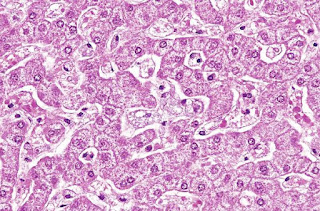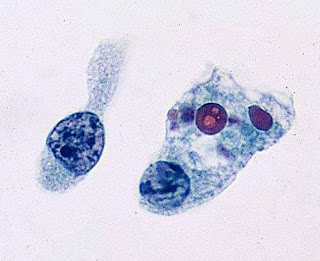Pathology MCQ 10
Pathology MCQ 10:
A 10-year-old child has had recurrent otitis media for the past 8 years. On physical examination, there is hepatosplenomegaly. No external anomalies are present. Laboratory findings include anemia and leukopenia. A bone marrow biopsy is performed, and high magnification of the sample shows the findings depicted in the figure. An inherited deficiency
of which of the following enzymes is most likely to produce
these findings?
A Alpha-1, 4-glucosidase
B Glucocerebrosidase
C Glucose-6-phosphatase
D Hexosaminidase A
E Lysyl hydroxylase
Explanation:
Gaucher disease type 1, seen in this child, accounts for 99% of cases and does not involve the central nervous system (CNS). It is caused by a deficiency of glucocerebrosidase, and infusion with this enzyme reduces severity and progression. Type 2 involves the CNS and is lethal in infancy. Type 3 also involves the CNS,
although not as severely as type 2.
A deficiency of alpha-1,4-glucosidase is a feature of Pompe disease.
Von Gierke disease results from deficiency of glucose-6-phosphatase.
Sphingomyelinase deficiency leads to Niemann-Pick disease types A and B. Type A, the more common form, is associated
with severe neurologic deterioration. Type B, the less common form, may resemble the findings in this case, but the appearance of macrophages is different: they contain many
small vacuoles.
Tay-Sachs disease involves a deficiency of
hexosaminidase A and is associated with severe mental retardation and death before 10 years of age. Lysyl hydroxylase
deficiency is found in one form of Ehlers-Danlos syndrome.So, the correct option is B.
(Fig1 P. C-Pathology core pictures)
Visit our website homepage for more articles on Pathology👇
www.pathologydiscussion.com
Feel free to share any of our articles on social media(Directly from the website) if you find it helpful. Thank you!!!!
A 10-year-old child has had recurrent otitis media for the past 8 years. On physical examination, there is hepatosplenomegaly. No external anomalies are present. Laboratory findings include anemia and leukopenia. A bone marrow biopsy is performed, and high magnification of the sample shows the findings depicted in the figure. An inherited deficiency
of which of the following enzymes is most likely to produce
these findings?
A Alpha-1, 4-glucosidase
B Glucocerebrosidase
C Glucose-6-phosphatase
D Hexosaminidase A
E Lysyl hydroxylase
Explanation:
Gaucher disease type 1, seen in this child, accounts for 99% of cases and does not involve the central nervous system (CNS). It is caused by a deficiency of glucocerebrosidase, and infusion with this enzyme reduces severity and progression. Type 2 involves the CNS and is lethal in infancy. Type 3 also involves the CNS,
although not as severely as type 2.
A deficiency of alpha-1,4-glucosidase is a feature of Pompe disease.
Von Gierke disease results from deficiency of glucose-6-phosphatase.
Sphingomyelinase deficiency leads to Niemann-Pick disease types A and B. Type A, the more common form, is associated
with severe neurologic deterioration. Type B, the less common form, may resemble the findings in this case, but the appearance of macrophages is different: they contain many
small vacuoles.
Fig2:Niemann-Pick ds histology((P.C:Humpath)
hexosaminidase A and is associated with severe mental retardation and death before 10 years of age. Lysyl hydroxylase
deficiency is found in one form of Ehlers-Danlos syndrome.So, the correct option is B.
(Fig1 P. C-Pathology core pictures)
Visit our website homepage for more articles on Pathology👇
www.pathologydiscussion.com
Feel free to share any of our articles on social media(Directly from the website) if you find it helpful. Thank you!!!!




Comments
Post a Comment
Thank you for posting your comment.Your question will be answered soon.